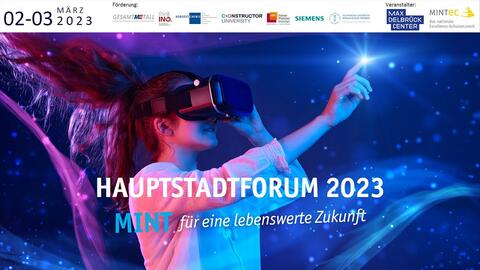AI & Cancer Research: Insights for Students
In her keynote speech, Professor Katja Simon emphasized the importance of research being useful for people: “With our work, we want to contribute to people living not only longer, but healthier lives.” As the head of the research group "Cell Biology of Immunity" at the Max Delbrück Center, Simon investigates how degradation processes in cells can help support the immune system. She shared insights from an as-yet-unpublished study of COVID-19-vaccination with the students and teachers, which found that a dietary substance can help maintain the memory function of T cells in mice, protecting against re-infection with the same pathogen through their immunological memory. The effectiveness of the vaccination is also based on this. The memory capacity of human immune cells also improved, as confirmed by tests on 40 healthy volunteers. Simon concluded by advocating research as a career, stating that it's an unbeatable and great profession.
Machine learning: exciting and very useful
The “MINT-EC Hauptstadtforum”, which was held hybrid this year, attracted 350 students and 120 teachers from the national network of excellence for mathematics, engineering, science, and technology subjects. Attendees exchanged ideas, took advantage of workshop offerings, and explored promising career options. The offerings, including the opening lecture, were streamed, while others were available exclusively online. The PhD student Anna Welter from the research group "Proteome Dynamics" and her colleague Madhu Kantharaju from the technology platform "Image Data Analysis" organized an online workshop called "What Can We Learn About Health Using Machine Learning?". A total of 22 science and industry partners, including the Max Delbrück Center, designed the two-day program of the event.
On day two, a dozen students logged into a Zoom session where they had the opportunity to deepen their knowledge of machine learning. Many of them were already familiar with artificial intelligence from school. Maja Lampe was pleased to practice her English language skills at the workshop, while Sercan Sahin, whose mother works in oncology, was aware of the benefits of machine learning in detecting changes on tumor scans.
Anna Welter who is researching the interaction of proteins in the cells of cancer patients for her doctoral thesis, measures thousands of proteins in a single sample using mass spectrometry. She demonstrated how machine learning can simplify and interpret huge amounts of data and even find patterns: What do certain samples have in common? What do we learn from this about treatment options?
"Better understood than in school"
In the practical part of the workshop, Madhu Kantharaju showed the students how the programming language "Python" works, which can analyze images using machine learning. For her doctoral research, she is also developing algorithms to correct artifacts in high-resolution microscopy images - such as of a zebrafish brain. The images allow researchers to identify which parts of the brain are active while the fish is swimming, despite the distortion caused by movement or blood flow in organs.

MINT Capital Forum 2023 | Livestream of the main event, day 1

MINT Capital Forum 2023 | Livestream of the main event, day 2
After four and a half hours of intensive workshops, Welter and Kantharaju asked the students for feedback. They appreciated that the doctoral students had reported from their own projects. "It was fun, you could learn a lot," was a common reaction. “I understood Python better than I did in school," Maja wrote in the chat. She considers delving deeper into machine learning in the future, possibly as a researcher.
Text: Wiebke Peters














